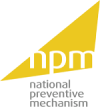Response to CPT report on UK detention
UK’s National Preventive Mechanism welcomes report from European Detention Monitoring Body
The UK National Preventive Mechanism welcomes the publication of the report of the European Committee for the Prevention of Torture and Inhuman or Degrading Treatment or Punishment (CPT), published today (19 April).
The CPT’s 101-page report examines practices in police stations, prisons, immigration removal centres and mental health detention, after a visit to the UK from 20 March to 12 April 2016.
Among many issues covered, the CPT calls for a review of the use of ‘spit helmets’ in police custody and makes recommendations about practices in TACT suites (where detainees are held under the Terrorism Act). The CPT identifies overcrowding in prisons as a problem that negatively affects many aspects of prison life. They welcome the government’s recognition of the need for profound reform of the prison system.
The CPT also sets out a range of important concerns around safeguards for consenting to treatment in mental health detention, the powers of the Mental Health Tribunal, and the use of restraint and the practice of long term segregation.
John Wadham, chair of the UK NPM said:
“The CPT report gives the NPM much to reflect on. A great deal of what they say echoes our own concerns. Our research shows that more than 124,000 people are detained in the UK on any given day. This report is an important reminder that there is much to be done to improve the conditions in which people are held and how they are treated. Governments and detention authorities need to involve our members in their work to take forward these recommendations and to improve the conditions in our prisons, hospitals and detention centres.
“I am particularly concerned by their finding that a number of children held in one young offender institution spent 23.5 hours a day locked in their cells. I agree with the CPT that such conditions amount to inhuman and degrading treatment.
“We welcome the CPT’s focus on the use of isolation and segregation across all types of detention, and encourage the authorities to use the NPM’s recently published comprehensive guidance to make the changes necessary.
“The CPT is an authoritative and experienced body that visits places of detention in 47 countries. This report is helpful in measuring how practice in the UK meets standards that are expected of countries all around Europe.”
Notes to editors:
1. The CPT is made up of independent and impartial experts with a wide range of experience in prison and policing, law and health. It was set up under the Council of Europe’s “European Convention for the Prevention of Torture and Inhuman or Degrading Treatment or Punishment”, which came into force in 1989. The CPT conducts visits to all member states where they have unlimited access to places of detention, and the right to move inside such places without restriction. They interview people deprived of their liberty in private, and communicate freely with anyone who can provide information. The report is here: http://www.coe.int/en/web/cpt/home (opens in a new tab).
2. During its 2016 visit, the CPT delegation visited the following places of detention:
Police establishments
- Brixton Police Station, Metropolitan Police
- Charing Cross Police Station, Metropolitan Police
- Paddington Green Police Station, Metropolitan Police
- Southwark Police Station, Metropolitan Police
- St Anne’s Police Station, Liverpool, Merseyside Police
Immigration Detention establishments
- Yarls Wood Immigration Detention Centre
- Colnbrook Immigration Removal Centre (targeted visit)
Prison establishments
- Cookham Wood Young Offender Institution (YOI)
- HMP &YOI Doncaster
- HMP Pentonville
Department of Health establishments (psychiatric care)
- Ashworth High Secure Hospital, Liverpool
- Broadmoor High Secure Hospital, Berkshire (targeted visit)
- Chase Farm Hospital, North London Forensic Service, London
- Highgate Mental Health Centre, London (targeted visit)
- St Charles Hospital, London
3. The UK’s National Preventive Mechanism is made up of 21 members across England, Northern Ireland, Scotland and Wales. It was established in 2009 to strengthen the protection of people in detention through independent monitoring. For more information, see: http://www.nationalpreventivemechanism.org.uk/
4. In January 2017, the NPM published a data mapping exercise which brought together detention population data across the UK.
5. In February 2017, the NPM published comprehensive guidance on monitoring isolation and detention
